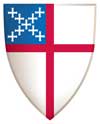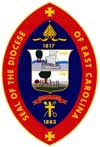To discuss the nature of the Anglicanism, we should diagram it from the parish level to the greater interdependent network of churches throughout the world. So, we will begin with our church, and work out:
Christ Episcopal Church
Christ Episcopal Church is a parish of The Episcopal Church, which is the American branch of the worldwide Anglican Communion. Within The Episcopal Church there are local jurisdictions, called dioceses. Christ Episcopal Church is a part of The Episcopal Diocese of East Carolina which includes all Episcopal churches in Eastern North Carolina from I-95 to the coast and from Southport up to Gatesville.
The Episcopal Diocese of East Carolina
Christ Church in Elizabeth City is a parish in The Episcopal Diocese of East Carolina, with offices in Kinston, NC. Our diocese was formed in 1883, and has one Bishop, The Right Rev. Robert Skirving, who oversees the spiritual and financial welfare of our community. He and his staff provide support and training to our priests and laity, run mission programs and college chaplaincies, and officiate at confirmation services. Every year, Bishop Skirving visits our parish for a Sunday service. There are 70 parishes, several military bases, a large Hispanic community, and many small historic parishes in the diocese. For more information on our diocese, click here.

The Episcopal Church
Our diocese is in Province IV of our national church, The Episcopal Church (the official name of our national church is The Domestic and Foreign Missionary Society of the Protestant Episcopal Church in the United States of America). The Episcopal Church consists of 109 dioceses and three regional areas in 17 nations. The Episcopal Church is a member province of the worldwide Anglican Communion.
The three orders of ordained clergy in The Episcopal Church are Bishops, Priests, and Deacons, each called to serve God's church in specific ways. The first among our ordained clergy is our Presiding Bishop, whose office is in New York, New York.
The mission of the church, as stated in the Book of Common Prayer’s catechism (p. 855), is "to restore all people to unity with God and each other in Christ."
The 2012 General Convention established the Anglican Communion Five Marks of Mission as a mission priority framework for the 2013-2015 triennium:
- To proclaim the Good News of the Kingdom
- To teach, baptize and nurture new believers
- To respond to human need by loving service
- To seek to transform unjust structures of society, to challenge violence of every kind and to pursue peace and reconciliation
- To strive to safeguard the integrity of creation and sustain and renew the life of the earth
 The Anglican Communion
The Anglican Communion
The Episcopal Church is recognized as one of the worldwide churches within the Anglican Communion, consisting of almost 90 million Christians. The see of the Anglican Communion is in Canterbury, England, and the Archbishop of Canterbury is the Bishop of England, and the first among equals "primus inter pares," amongst fellow Bishops. Christianity is the world's largest religion, with upwards of 2 billion followers on every continent. It is based on the teachings of Jesus Christ who lived in the Holy Land 2,000 years ago.
Anglicanism is one of the traditions, or expressions, of this Christian faith. Other Christian traditions include Roman Catholic, Eastern Orthodox, Oriental Orthodox and Protestant Churches, which include Lutheran, Baptist, Presbyterian, Methodist, and Pentecostal Churches. The theology and doctrines of the Anglican Church are rooted in the 16th century English Reformation. The Book of Common Prayer and the 39 Articles of Religion contain the historic teachings of Anglican Christianity. The word Anglican originates in ecclesia anglicana, a medieval Latin phrase dating to at least 1246 that means the English Church, but in the past two centuries the tradition has been adopted around the world. Now almost 90 million members are part of national or regional Churches that call themselves Anglican (or Episcopal in some countries) which collectively are known as the Anglican Communion.
Anglicans and Episcopalians the world over share aspects of their history, tradition and ways of worshiping. (Learn more about Anglican belief here) But no two churches are exactly alike even within a diocese, let alone a province or between countries. This unity in diversity is one of the things that make the Anglican Communion so special and such rich ground from which to change the world.
For more on the Anglican Communion of which The Episcopal Church is a part, click here.



